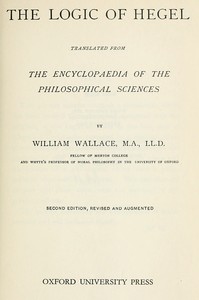The Logic of Hegel by Georg Wilhelm Friedrich Hegel
"The Logic of Hegel" by Georg Wilhelm Friedrich Hegel is a philosophical treatise written in the early 19th century. This work serves as a translation and explication of Hegel's "Encyclopaedia of the Philosophical Sciences," specifically focusing on the section dedicated to logic. It explores Hegel's system of thought, aiming to systematically reorganize the principles of reason and understanding in the pursuit of truth. The opening of this volume introduces readers to Hegel's
philosophical methodology, emphasizing the necessity for a disciplined and rigorous approach to understanding logic as a science. Rather than dealing with empirical observations, Hegel asserts that philosophy must transcend what is merely perceptible and aim for the underlying truths that connect all aspects of existence—those of God, nature, and the human spirit. He emphasizes the significance of thought and how it shapes our understanding of reality, challenging readers to appreciate that genuine knowledge is not simply subjective but rooted in a broader, interconnected framework of reason. The introduction sets the tone for a deep examination of how human thought intersects with the notions of being, essence, and the ultimate truths of existence. (This is an automatically generated summary.)
Read or download for free
| How to read | Url | Size | |||
|---|---|---|---|---|---|
| Read now! | https://www.gutenberg.org/ebooks/55108.html.images | 1.0 MB | |||
| EPUB3 (E-readers incl. Send-to-Kindle) | https://www.gutenberg.org/ebooks/55108.epub3.images | 486 kB | |||
| EPUB (older E-readers) | https://www.gutenberg.org/ebooks/55108.epub.images | 500 kB | |||
| EPUB (no images, older E-readers) | https://www.gutenberg.org/ebooks/55108.epub.noimages | 438 kB | |||
| Kindle | https://www.gutenberg.org/ebooks/55108.kf8.images | 767 kB | |||
| older Kindles | https://www.gutenberg.org/ebooks/55108.kindle.images | 683 kB | |||
| Plain Text UTF-8 | https://www.gutenberg.org/ebooks/55108.txt.utf-8 | 916 kB | |||
| Download HTML (zip) | https://www.gutenberg.org/cache/epub/55108/pg55108-h.zip | 455 kB | |||
| There may be more files related to this item. | |||||
Similar Books
About this eBook
| Author | Hegel, Georg Wilhelm Friedrich, 1770-1831 |
|---|---|
| Translator | Wallace, William, 1844-1897 |
| Uniform Title | Wissenschaft der Logik. English |
| Title | The Logic of Hegel |
| Note | Wikipedia page about this book: https://en.wikipedia.org/wiki/Science_of_Logic |
| Note | Reading ease score: 46.6 (College-level). Difficult to read. |
| Credits |
Produced by Marc D'Hooghe at Free Literature (online soon in an extended version, also linking to free sources for education worldwide ... MOOC's, educational materials,...) Images generously made available by the Hathi Trust. |
| Language | English |
| LoC Class | B: Philosophy, Psychology, Religion |
| Subject | Logic |
| Category | Text |
| EBook-No. | 55108 |
| Release Date | Jul 13, 2017 |
| Copyright Status | Public domain in the USA. |
| Downloads | 618 downloads in the last 30 days. |
| Project Gutenberg eBooks are always free! | |


